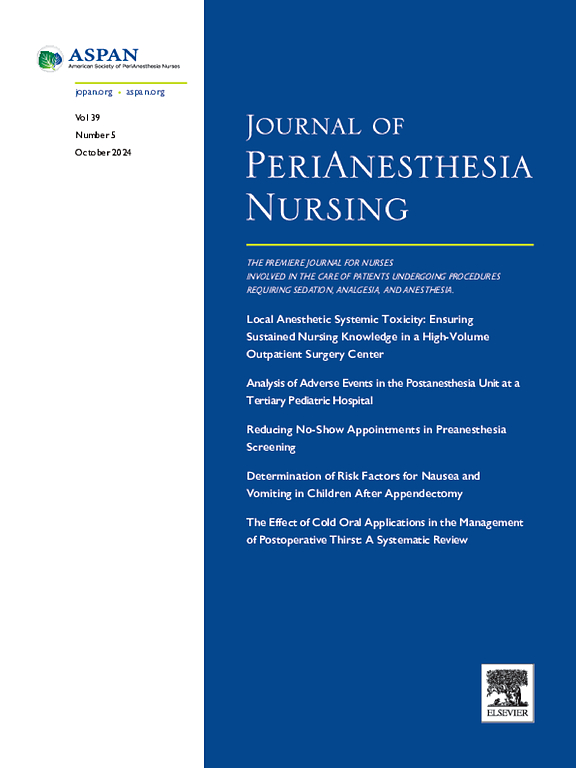The Effects of Preoperative Video-Assisted Education on Anxiety and Comfort After Breast Cancer Surgery: Nonrandomized Controlled Study
IF 1.6
4区 医学
Q2 NURSING
引用次数: 0
Abstract
Purpose
This study aimed to determine the effects of video-assisted education given before breast cancer surgery on patients' anxiety and comfort.
Design
A nonrandomized, controlled, quasi-experimental model was used.
Methods
The study was conducted in the general surgery clinic of a public hospital. Seventy patients voluntarily participated in the study, 35 of them were in the Control (CG) and 35 of them were in the Experimental Group (EG). While routine treatment and care were given to CG, a video-assisted education was also provided to EG. The data were collected using the Personal Information Form, State-Trait Anxiety Inventory (STAI), and General Comfort Questionnaire (GCQ). The patients in both groups filled in the STAI and GCQ on the first day preoperatively, STAI-S and GCS on the second postoperative day and STAI-S on the tenth day after surgery. P < .05 was accepted as a statistical significance value.
Findings
The groups were similar in terms of descriptive features and preoperative anxiety scores (P > .05). Postoperative second and tenth-day anxiety scores were significantly higher in CG (43.97 ± 9.42 and 39.45 ± 3.88) compared to EG (33.29 ± 4.94 and 33.31 ± 3.01) (P < .05). In terms of the mean scores of the GCQ and its subscales of comfort, preoperative comfort was found to be lower than postoperative comfort level (P < .05).
Conclusions
Preoperative video-assisted education decreased the anxiety level and increased the comfort level in EG. We conclude that the use of video-assisted education in reducing anxiety and increasing the perception of comfort in breast cancer surgery patients would be beneficial.
术前视频辅助教育对乳腺癌术后焦虑和舒适感的影响:非随机对照研究
目的:本研究旨在确定乳腺癌手术前进行视频辅助教育对患者焦虑和舒适度的影响:方法:研究在一家公立医院的普外科门诊进行:研究在一家公立医院的普外科门诊进行。70名患者自愿参与研究,其中35人为对照组(CG),35人为实验组(EG)。对照组患者接受常规治疗和护理,实验组患者则接受视频辅助教育。数据收集采用个人信息表、状态-特质焦虑量表(STAI)和一般舒适度问卷(GCQ)。两组患者均在术前第一天填写了 STAI 和 GCQ,术后第二天填写了 STAI-S 和 GCS,术后第十天填写了 STAI-S。P 结果:两组在描述性特征和术前焦虑评分方面相似(P > .05)。与 EG(33.29±4.94 和 33.31±3.01)相比,CG 的术后第二天和第十天焦虑评分明显更高(43.97±9.42 和 39.45±3.88)(P 结论:CG 和 EG 的术后第二天和第十天焦虑评分明显更高(33.29±4.94 和 33.31±3.01):术前视频辅助教育降低了 EG 的焦虑水平,提高了舒适度。我们得出的结论是,使用视频辅助教育来降低乳腺癌手术患者的焦虑程度并提高其舒适感是有益的。
本文章由计算机程序翻译,如有差异,请以英文原文为准。
求助全文
约1分钟内获得全文
求助全文
来源期刊

Journal of Perianesthesia Nursing
NURSING-
CiteScore
2.20
自引率
17.60%
发文量
279
审稿时长
90 days
期刊介绍:
The Journal of PeriAnesthesia Nursing provides original, peer-reviewed research for a primary audience that includes nurses in perianesthesia settings, including ambulatory surgery, preadmission testing, postanesthesia care (Phases I and II), extended observation, and pain management. The Journal provides a forum for sharing professional knowledge and experience relating to management, ethics, legislation, research, and other aspects of perianesthesia nursing.
 求助内容:
求助内容: 应助结果提醒方式:
应助结果提醒方式:


